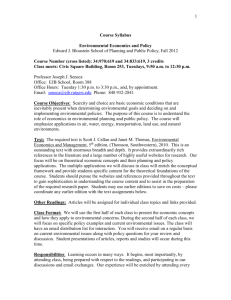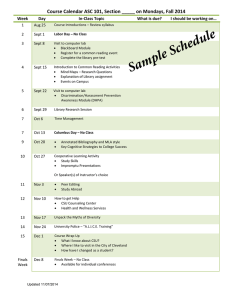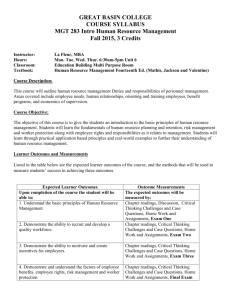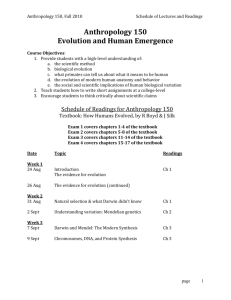Alexander L. Metcalf 440 Charles H. Clapp Building ;
advertisement
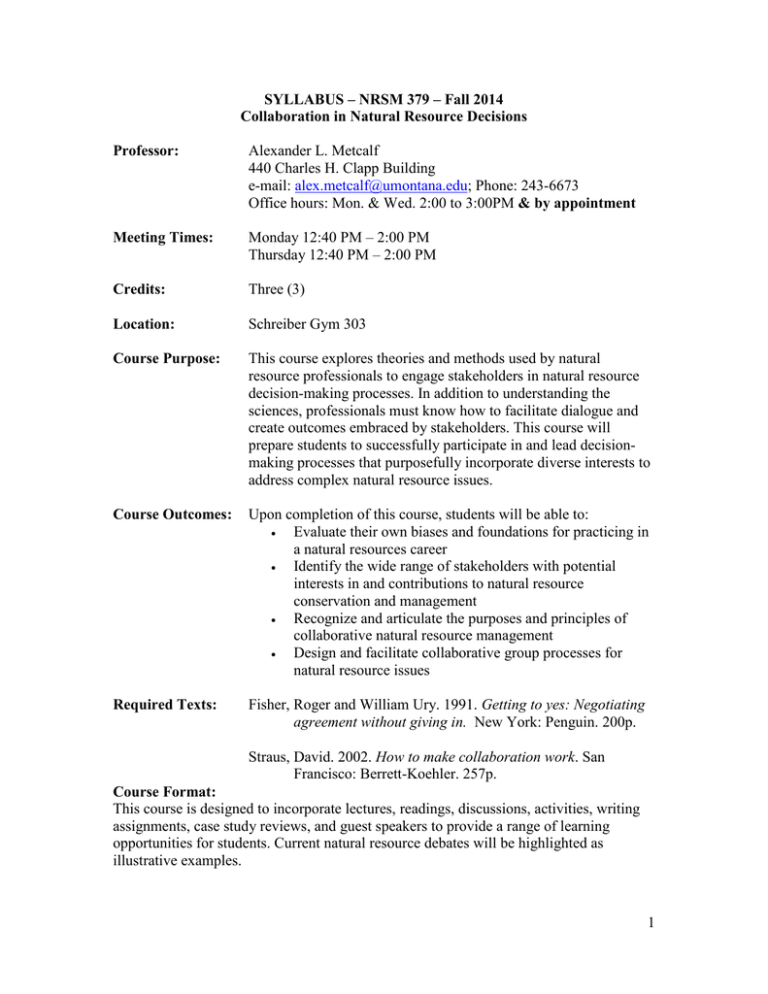
SYLLABUS – NRSM 379 – Fall 2014 Collaboration in Natural Resource Decisions Professor: Alexander L. Metcalf 440 Charles H. Clapp Building e-mail: alex.metcalf@umontana.edu; Phone: 243-6673 Office hours: Mon. & Wed. 2:00 to 3:00PM & by appointment Meeting Times: Monday 12:40 PM – 2:00 PM Thursday 12:40 PM – 2:00 PM Credits: Three (3) Location: Schreiber Gym 303 Course Purpose: This course explores theories and methods used by natural resource professionals to engage stakeholders in natural resource decision-making processes. In addition to understanding the sciences, professionals must know how to facilitate dialogue and create outcomes embraced by stakeholders. This course will prepare students to successfully participate in and lead decisionmaking processes that purposefully incorporate diverse interests to address complex natural resource issues. Course Outcomes: Upon completion of this course, students will be able to: Evaluate their own biases and foundations for practicing in a natural resources career Identify the wide range of stakeholders with potential interests in and contributions to natural resource conservation and management Recognize and articulate the purposes and principles of collaborative natural resource management Design and facilitate collaborative group processes for natural resource issues Required Texts: Fisher, Roger and William Ury. 1991. Getting to yes: Negotiating agreement without giving in. New York: Penguin. 200p. Straus, David. 2002. How to make collaboration work. San Francisco: Berrett-Koehler. 257p. Course Format: This course is designed to incorporate lectures, readings, discussions, activities, writing assignments, case study reviews, and guest speakers to provide a range of learning opportunities for students. Current natural resource debates will be highlighted as illustrative examples. 1 Grading and Course Requirements: Please note, this class is offered for traditional letter grade only, it is not offered under the credit/no credit option. This course will be graded on the following grading scale: 93-100 (A), 90-92 (A-), 87-89 (B+), 83-86(B), 80-82 (B-), 77-79 (C+), 73-76 (C), 70-72 (C-), 60-69 (D), <60 (F). Students will be required to participate in group exercises throughout the semester and will be graded on their ability to lead and provide written summaries of small group proceedings. Students will be expected to complete reading and writing assignments assigned prior to each class and actively participate in class discussions. Each student will also be required to attend at least one session of a public meeting outside of class (usually held in the evenings). Any writing assignment submitted after the due date will lose 10 percent of the possible grade each day. In certain circumstances, late papers will be accepted if approved by the instructor, in writing, at least 24 hours in advance of the due date. Only those circumstances approved by the instructor beforehand will allow for make-up quizzes or exams. Grades will be based on the following rubric: 25% - Class participation & exercises (e.g., discussions, exercises, reflective writing, small group projects, quizzes) 20% - Paper: Natural resource issue review 10% - Mid-term exam – 10% 35 % - Collaborative Issue Project o Project outline & plan (5%) o Individually-written blog post (20%) o Group Presentation (10%) 10% - Final examination – 10% 100% TOTAL Academic Honesty: All students must practice academic honesty. Academic misconduct is subject to an academic penalty by the course instructor and/or a disciplinary sanction by the University. All students need to be familiar with the Student Conduct Code. The Code is available for review online at http://www.umt.edu/vpsa/policies/student_conduct.php. Plagiarism will not be tolerated; all plagiarism will result in reduced credit for the assignment, zero credit for the assignment, zero-credit for the course, and/or reference to the Provost and Vice President for Academic Affairs. Equal Access: The University of Montana assures equal access to instruction through collaboration between students with disabilities, instructors, and Disability Services for Students (DSS). If you think you may have a disability adversely affecting your academic performance, and you have not already registered with DSS, please contact DSS in Lommason 154 or 406.243.2243. I will work with you and DSS to provide an appropriate modification. 2 Grading Option Statement: At UM, grading options for courses are traditional letter grade only (T); credit/no credit only (CR/NC), or student option/preference (O). The latter means students can choose to take a course either as traditional letter grade or as credit/nocredit. For these letter courses, some students wish to exercise this option at the end of the semester. Some colleges at UM (e.g., CAS) prefer faculty to offer classes as “student preference.” However, most CFC classes are offered Traditional letter grade only. If you offer your class for a letter grade only, you may experience fewer student requests on this issue at the end of the semester if you include the following statement: o Please note, this class is offered for traditional letter grade only, it is not offered under the credit/no credit option. If you are uncertain how your class is offered, check with CFC’s Office of Student Services (Shonna, Jeanne, or Wendy). Upper-Division Writing Courses: NRSM is an upper-division writing course within the College of Forestry and Conservation. These courses are designed to give students more experience with collegelevel writing. The following are the writing course learning outcomes and upper-division writing requirement in the major outcomes: Writing Course Learning Outcomes: Use writing to learn and synthesize new concepts Formulate and express written opinions and ideas that are developed, logical, and organized Compose written documents that are appropriate for a given audience or purpose Revise written work based on constructive feedback Find, evaluate, and use information effectively and ethically Begin to use discipline-specific writing conventions Demonstrate appropriate English language usage Upper-Division Writing Requirement in the Major Outcomes: Identify and pursue more sophisticated questions for academic inquiry Find, evaluate, analyze, and synthesize information effectively from diverse sources Manage multiple perspectives as appropriate Recognize the purposes and needs of discipline-specific audiences and adopt the academic voice necessary for the chosen discipline Use multiple drafts, revision, and editing in conducting inquiry and preparing written work Follow the conventions of citation, documentation, and formal presentation appropriate to that discipline Develop competence in information technology and digital literacy 3 Important Dates Restricting Opportunities to Drop a Course Spring 2014: To 15th instructional Students can drop classes on Cyberbear September 15 = day last day th th 16 to 45 Drop requires form with instructor and September 16 instructional day advisor signature, a $10 fee from registrar’s through October office, student will receive a ‘W’. 27 Beginning 46th Students are only allowed to drop a class October 28 instructional day under very limited and unusual circumstances. Not doing well in the class, deciding you are concerned about how the class grade might affect your GPA, deciding you did not want to take the class after all, and similar reasons are not among those limited and unusual circumstances. If you want to drop the class for these sorts of reasons, make sure you do so by the end of the 45th instructional day of the semester. Please be mindful of others and do not use cell phones, use smokeless tobacco, or eat food in class (especially if it is smells really good and you don’t have enough to share). Your UM e-mail is the only way I am allowed to communicate with you about University-related and course-related business. You are expected to check, read, and (if necessary) respond to your e-mail on a regular basis. 4 TENATIVE SCHEDULE: Week 1 Aug. 25 – Welcome! Introduction and overview of collaboration Aug. 27 – Human dimensions of natural resources decisions Readings: Hanging question marks on our professions (Parker 1992) View: Balance under the Big Sky (CWP 2013) Week 2 Sept. 1 – Labor Day (NO CLASS) Sept. 3 - Incorporating people in natural resource decisions Readings: Excerpt from Collapse (Diamond 2011) SAF commentaries (Heissenbuttel 2001; Wiant 1997a; Wiant 1997b) Snappin’ them red suspenders (Egan 1996) Week 3 [Paper 1 topic & outline due Sept. 10] Sept. 8 – Public role in Federal land management Readings: Excerpts from: The Forest Service and the Greatest Good (Lewis 2005) The American people and the National Forests (Hays 2009) Supplemental Readings (planning rule, summary, and reactions) Sept. 10 - Private lands management Readings: America’s Family Forests (Butler and Leatherberry 2004) Excerpts from: The Northern Forest (Dobbs and Ober 1996) The future of the Northern Forest (Klyza and Trombulak 2000) America’s private forests (Best and Wayburn 2001) Week 4 [Form Final Project Groups due Sept. 15] Sept. 15 – Elements and designs of collaboration Readings: Community forestry, defined (Brendler and Carey 1998) Community-based forestry groups (Cheng and Fernandez-Gimenez 2007) Sept. 17 – Examples of collaboration Readings: Excerpts from: Forest communities, community forests (Baker and Kusel 2003) Natural connections (Western and Wright 1994) Tragedy of the Commons (Hardin 1968) 5 Week 5 [Paper 1 due Sept. 24] Sept. 22. – Examples of collaboration (con’t) Reading: From them to us: The Applegate partnership (Sturtevant and Lange 2003) Sept. 24 – Principals and ideals of collaboration Reading: Collaborative public management and democracy: Evidence from western watershed partnerships (Leach 2006) Week 6 [Public meeting plan due Sept. 29] Sept. 29 – Attitudes, values, and beliefs Readings: A value-attitude-behavior model predicting wildland preservation voting intentions (Vaske and Donnelly 1999) Excerpt from: Navigating environmental attitudes (Heberlein 2012) Oct. 1 – Interests vs. position – Inventing options for mutual gain Readings: Getting to yes (Fisher and Ury 1991) How to make collaboration work (Straus 2002) Week 7 [Final Project topic/outline/plan due Oct. 8] Oct. 6 – Principled Negotiation Readings: Getting to yes (Fisher and Ury 1991) How to make collaboration work (Straus 2002) Oct. 8 - Personal reflection – our commitment to natural resources - and Bracketing and interview/questioning techniques Readings Due: The patient, the nurse, and the philosopher (unknown) Excerpts from: The loop (Evans 1998) Listening to patients: A phenomenological approach to nursing research and practice (Thomas and Pollio 2002) Week 8 Oct. 13 – Bracketing and interview/questioning techniques, continued Review for Mid-Term Exam Readings: TBD Oct. 15– Mid-Term Exam 6 Week 9 Oct. 20 – Facilitation: Meeting administration & organization Reading: How to make collaboration work (Straus 2002) Oct. 22 – Facilitation: Process mapping & Beyond ice-breakers Reading: How to make collaboration work (Straus 2002) Common ground on hostile turf (Moore 2013) Week 10 (Apr. 1 and 3) Oct. 27 – Independent Final Project work Oct. 29 – Final Project feedback and work Week 11 Nov. 3 – Power Dynamics Readings: Excerpts from: Power dynamics at multiple structural scales in collaborative forest management (Greer 2012) Nov. 5 – Dimensions of Trust Readings: TBD Week 12 Nov. 10 – Guest Speaker (room in schedule) Gary Burnett & Melanie Parker Nov. 12 – Guest Speaker (room in schedule) Jim Burchfield Week 13 Nov. 17 – Final project feedback/discussions (room in schedule) Nov. 19 – Final project presentations Week 14 Nov. 24 - TBD Nov. 26 – Thanksgiving Travel Day (NO CLASS) Week 15 Dec. 1 – Final project presentations Dec, 3 – Semester debrief and Final Exam Review Final Exam - date and time: TBD 7 8
